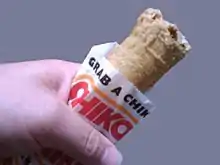Chiko Roll
The Chiko Roll is an Australian savoury snack invented by Frank McEncroe, inspired by the Chinese spring roll and first sold in 1951 as the "Chicken Roll" despite not actually containing chicken.[1] The snack was designed to be easily eaten on the move without a plate or cutlery. Since 1995 they have been owned by Simplot Australia.

A Chiko Roll's filling is primarily cabbage and barley, as well as carrot, green beans, beef, beef tallow, wheat cereal, celery and onion. This filling is partially pulped and enclosed in a thick egg and flour pastry tube designed to survive handling at football matches. The roll is typically deep-fried in vegetable oil.
At the peak of its popularity in the 1960s and 1970s, 40 million Chiko Rolls were sold annually in Australia. The product has been described as an Australian cultural icon.[2][3][4]
Other products currently available under the Chiko brand include Corn Jacks, Hawaiian and Supreme pizza subs, Spudsters, onion rings, fish cakes and vegetable nuggets.[5]
History
Development
The Chiko Roll was developed by Frank McEncroe, a boilermaker from Bendigo, Victoria, who turned to catering at football matches and other outdoor events.[6] In 1950, McEncroe saw a competitor selling Chinese chop suey rolls outside the Richmond Cricket Ground and decided to add a similar product to his own line. McEncroe felt that the Chinese rolls were too flimsy to be easily handled in an informal outdoor setting and hit upon the idea of a much larger and more robust roll that would provide a quick meal that was both reasonably substantial and easily handled. The result was the Chiko Roll, which debuted at the Wagga Wagga Agriculture Show in 1951.[7][8][9]
Popularity
In the 1960s, McEncroe moved to Melbourne with his family where he began to manufacture the rolls with the use of an adapted sausage machine. As the product became more popular, McEncroe moved his production to a larger factory in the suburb of Essendon. He later merged his business with a local company called Floyd's Iceworks to form Frozen Food Industries Pty Ltd. The new company went public in 1963. By 1965, many Australian takeaway restaurants, especially fish and chip shops, carried Chiko Rolls,[7] with the marketing slogan "Grab a Chiko" signifying the ease with which shop owners could take a Chiko Roll from the freezer and put it into a fryer, and slide it into its own trademarked bag. At the height of their popularity in the 1970s, 40 million Chiko Rolls were being sold Australia-wide each year and more than one million were exported to Japan.[4]
Recent years
Since 1995, the Chiko brand has been owned by Simplot Australia. All Chiko Rolls are now manufactured in Bathurst, New South Wales, on a specifically designed machine that produces the pastry and filling at the same time in long rolls. They are then automatically sliced and then the distinctive ends are folded.
Increasing competition in the Australian takeaway food market in recent decades has seen a decline in the profile of the Chiko Roll, with consumption down to 17 million per annum in 2011.[10] However, they remain a popular snack at sporting events and are still widely available at fish and chip shops and supermarkets across Australia.
In September 2016 a disagreement in the Parliament of New South Wales over the origins of the Chiko Roll occurred. The Nationals' Member for Calare Andrew Gee, Labor’s Member for Bendigo Lisa Chesters and Member for Riverina Michael McCormack all claimed the snack originated in their respective hometowns.[11]
To celebrate the 50th anniversary of the creation of the Chiko Roll the current manufacturer presented gold-plated replicas to Bendigo and Wagga Wagga cities.[12]
In October 2016 Karratha resident Mark Habermehl cooked a meat pie and a Chiko Roll on a barbeque in an attempt to avoid washing dishes. The event made the local newspaper and prompted a nomination for Australian of the Year, recognising the 'Australian-ness' of his choice of cuisine, selection of cooking device and ingenuity.[13]
Chiko Chick
Since the 1950s, Chiko Rolls have been advertised featuring the "Chiko Chick" character, a seductive woman on a motorbike accompanied by the slogan "Couldn't you go a Chiko Roll?"[7][14] During the early 1980s, the accompanying slogan "You can't knock the roll" was used.
In 2008, the company began a nationwide search for the new "Chiko Chick", hoping to downplay the traditionally raunchy look in favour of a more wholesome "girl next door" image.[2][3] On 17 July 2008, the new advertising poster was unveiled at the Wagga Wagga Showgrounds featuring Annette Melton as the new face.[9]
References
- "Chiko Rolls". CooksInfo.com. Retrieved 12 January 2016.
- Chiko's search for roll model Archived 25 February 2008 at the Wayback Machine, news.com.au website.
- "Chiko Roll Nostalgia" Archived 21 June 2009 at the Wayback Machine, TV story from the Nine Network's A Current Affair news magazine program.
- McEncroe, Francis Gerard (Frank) – David Dunstan, Australian Dictionary of Biography Online.
- "Chiko – Products". www.chiko.com.au. Retrieved 21 January 2016.
- "The Chiko Roll: aussie snack icon". Wagga Wagga City Council. Museum of the Riverina. Archived from the original on 24 July 2008. Retrieved 25 July 2008.
- "The Chiko Roll". Up From Australia. Retrieved 3 April 2008.
- "Fun Facts". Wagga Wagga Guide. Retrieved 3 April 2008.
- Davies, Laura (18 July 2008). "Chiko chick is back". Fairfax Media. The Daily Advertiser. Retrieved 10 August 2016.
- Pitt, Helen (15 August 2012). "Farewell to surfie molls and panel vans". The Sydney Morning Herald. Fairfax. Retrieved 15 August 2012.
- "Three regional MPs at war over the origin of the Chiko Roll". News.com.au. Retrieved 4 September 2017.
- "The Gold Chiko Roll". Wagga City Council. Retrieved 12 October 2013.
- "Chuck another Chiko on the barbie". Seven West Media. Retrieved 8 November 2016.
- Chiko still on a roll fifty years on Archived 20 July 2008 at the Wayback Machine, Simplot Australia website.
External links
| Wikimedia Commons has media related to Chiko Roll. |
